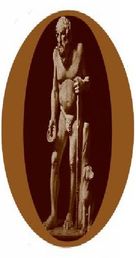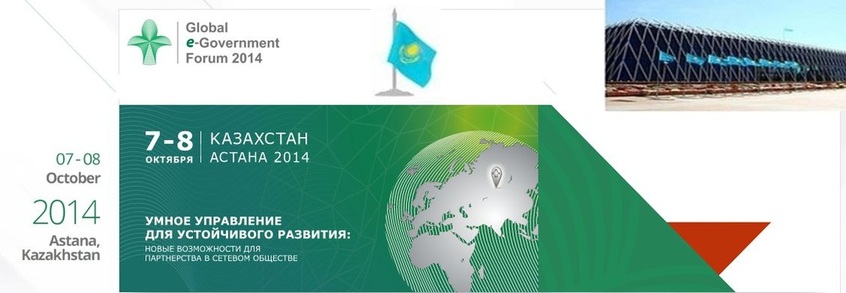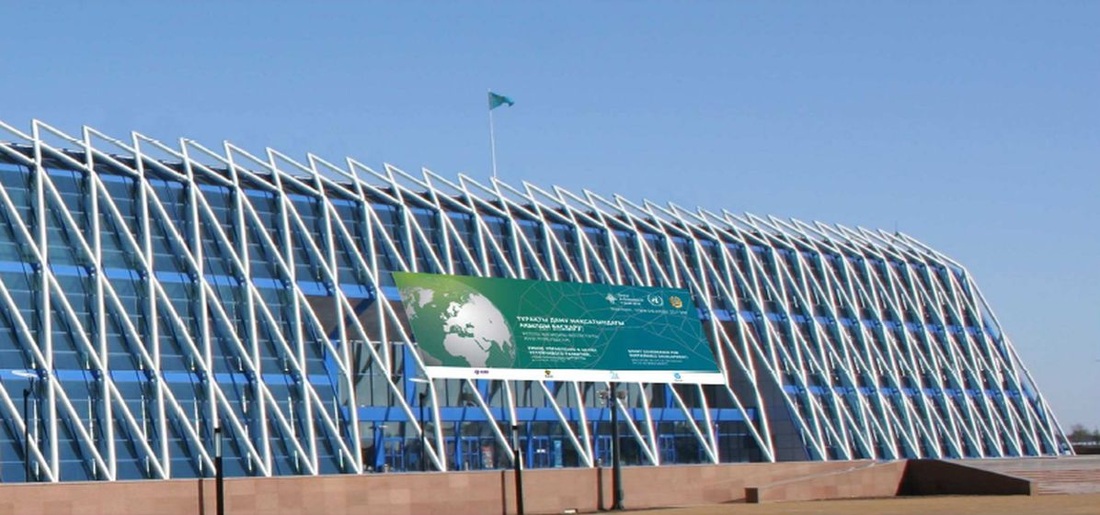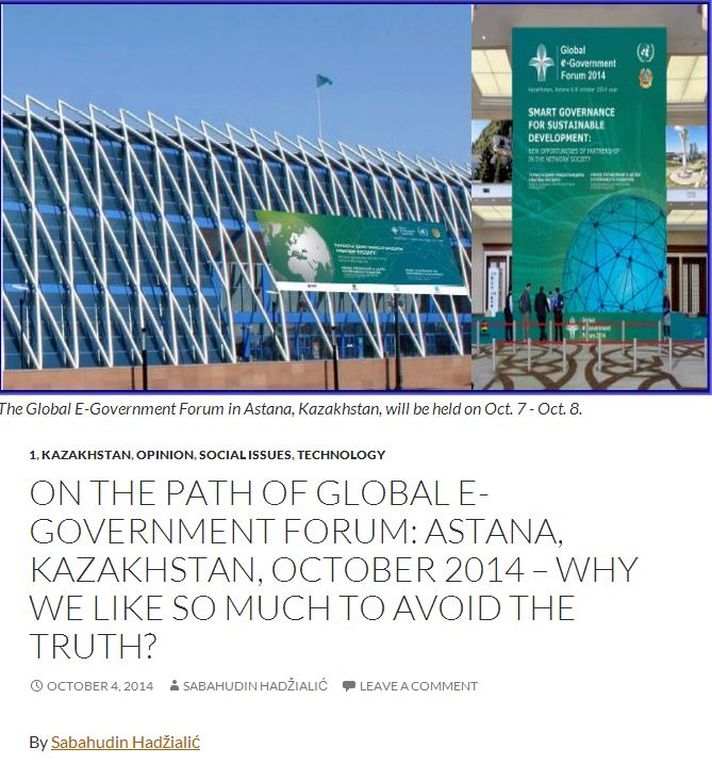All Rights Reserved
Publishers and owners:
Prof. Dr. and Dr. Honoris Causa
Sabahudin Hadžialić
and Peter Tase, MBA
Whitefish Bay, WI, United States of America
MI OBJEDINJUJEMO RAZLIČITOSTI...
WE ARE UNIFYING DIVERSITIES
Publishers and owners:
Prof. Dr. and Dr. Honoris Causa
Sabahudin Hadžialić
and Peter Tase, MBA
Whitefish Bay, WI, United States of America
MI OBJEDINJUJEMO RAZLIČITOSTI...
WE ARE UNIFYING DIVERSITIES
VENUE - FORUM
The Independence Palace, Tauelsizdik Avenue, 52., Astana, Kazakhstan
4.10.2014
By Eurasia Review - Sabahudin Hadžialić
ON THE PATH OF GLOBAL E-GOVERNMENT FORUM:
ASTANA, KAZAKHSTAN, OCTOBER 2014 –
WHY WE LIKE SO MUCH TO AVOID THE TRUTH?
The United Nations is the organisation which, through executing precisely, concretely and thoroughly the E-Government survey 2014 (with almost 300 pages in length) explores the scientific, social, political and cultural approach for establishing a path for the worldwide presence of E-Government, which as they underline is “for the future we want.”Although, there is always… a “but.” Why? The answer is simple: We are humans. And humans tend to do everything possible to undermine all the good that has been sent (or given, or learned) to us since the dawn to of civilization, regardless if it came from God, Budda, Allah or another kind of reflected energy. How is that?
First, before I try to give an answer on the above question, I would like to quote “the most dangerous philosopher of the West,” the respected colleague from Slovenia, Slavoj Žižek ( both of us are on the International board of the magazine “New Flame“ (Zagreb, Croatia) who is really painfully denuding the form of the essence of the ruling in the World of XXI century (quote from Kliker.info as of 21.8.2014): “The main culprits for the financial deluge of 2008 now are imposing themselves as the professionals that might be able to carry us on the painful path of financial recovery, and whose advices should therefore be more important than parliamentary politics. Or, as said the former Italian Prime Minister and technocrat Mario Monti, EU: “If the governments allow them to be fully commited by the decisions of their parliaments, and not protect their own freedom of action, the collapse of Europe will be much more likely outcome than its deeper integration.” What is, therefore, a higher power whose authority will suspend the decisions of democratically elected people’s representatives? The answer is given in 1998 by Hans Tietmeyer, Governor of Deutsches Bundesbank, which considered “permanent plebiscite of global markets” superior to “plebiscite of the ballot box.” Notice the rhetoric of this shameful statement: global markets are more democratic than parliamentary elections, since the voting process takes place continuously on them, instead of once every four years, and globally, rather than in the framework of the nation state. The basic idea: when separated from more control of the market (and experts), parliamentary-democratic decisions are “irresponsible.”
Finally, after quotation, another question then appears: How can this be related to the forth-coming Global E-Government Forum in Astana, Kazakhstan which will be held in a couple of days. as Eurasia Review recently announced?
It is almost possible to see light at the end of tunnel as addressed by some of the topics of the the Global E-Government Forum in Astana which can be seen at Agenda at glance – 2014 Global E-Government Forum.
Basically, to make a long story short, “Power to the people“ through better, bigger and sustainable E-government execution and connection is not just through:
Maybe to use the words: ” We do not inherit the Earth from our Ancestors, we borrow it from our Children,” as goes the quote of an Ancient Indian Proverb, but having in mind that nothing can be done without seriously considering interaction between the UN E-Government survey 2014 and quoted sentences of Slavoj Žižek, the “most dangerous philosopher of the world”.
If we do not do that, the phrase “for the future we want“, will be just another slogan that bites the dust and we will keep asking ourselves, why do we like so much to avoid the truth? Even in the forthcoming E-Government Hyperconnected society.
By Eurasia Review - Sabahudin Hadžialić
ON THE PATH OF GLOBAL E-GOVERNMENT FORUM:
ASTANA, KAZAKHSTAN, OCTOBER 2014 –
WHY WE LIKE SO MUCH TO AVOID THE TRUTH?
The United Nations is the organisation which, through executing precisely, concretely and thoroughly the E-Government survey 2014 (with almost 300 pages in length) explores the scientific, social, political and cultural approach for establishing a path for the worldwide presence of E-Government, which as they underline is “for the future we want.”Although, there is always… a “but.” Why? The answer is simple: We are humans. And humans tend to do everything possible to undermine all the good that has been sent (or given, or learned) to us since the dawn to of civilization, regardless if it came from God, Budda, Allah or another kind of reflected energy. How is that?
First, before I try to give an answer on the above question, I would like to quote “the most dangerous philosopher of the West,” the respected colleague from Slovenia, Slavoj Žižek ( both of us are on the International board of the magazine “New Flame“ (Zagreb, Croatia) who is really painfully denuding the form of the essence of the ruling in the World of XXI century (quote from Kliker.info as of 21.8.2014): “The main culprits for the financial deluge of 2008 now are imposing themselves as the professionals that might be able to carry us on the painful path of financial recovery, and whose advices should therefore be more important than parliamentary politics. Or, as said the former Italian Prime Minister and technocrat Mario Monti, EU: “If the governments allow them to be fully commited by the decisions of their parliaments, and not protect their own freedom of action, the collapse of Europe will be much more likely outcome than its deeper integration.” What is, therefore, a higher power whose authority will suspend the decisions of democratically elected people’s representatives? The answer is given in 1998 by Hans Tietmeyer, Governor of Deutsches Bundesbank, which considered “permanent plebiscite of global markets” superior to “plebiscite of the ballot box.” Notice the rhetoric of this shameful statement: global markets are more democratic than parliamentary elections, since the voting process takes place continuously on them, instead of once every four years, and globally, rather than in the framework of the nation state. The basic idea: when separated from more control of the market (and experts), parliamentary-democratic decisions are “irresponsible.”
Finally, after quotation, another question then appears: How can this be related to the forth-coming Global E-Government Forum in Astana, Kazakhstan which will be held in a couple of days. as Eurasia Review recently announced?
It is almost possible to see light at the end of tunnel as addressed by some of the topics of the the Global E-Government Forum in Astana which can be seen at Agenda at glance – 2014 Global E-Government Forum.
Basically, to make a long story short, “Power to the people“ through better, bigger and sustainable E-government execution and connection is not just through:
- analysing and defining the problem/issue (like UN did in an excellent methodology fullfilled way);
- proposing the way on the path towards society of the people and for the people;
- an easy way to provide information to the people to make better judgment before executing final decision on any of the issue related to their ordinary lives (with exact deadline and methodology – when and how it will be executed);
- an easy way to make two-way street communication process for the Executive power to make better judgmeent in regards helping those above to do what is best for them and for the society in general;
Maybe to use the words: ” We do not inherit the Earth from our Ancestors, we borrow it from our Children,” as goes the quote of an Ancient Indian Proverb, but having in mind that nothing can be done without seriously considering interaction between the UN E-Government survey 2014 and quoted sentences of Slavoj Žižek, the “most dangerous philosopher of the world”.
If we do not do that, the phrase “for the future we want“, will be just another slogan that bites the dust and we will keep asking ourselves, why do we like so much to avoid the truth? Even in the forthcoming E-Government Hyperconnected society.
|
| ||||||||||||
Agenda
DIOGEN pro culture magazine provides you the direct link to view:
Here are all the photos as it comes online
|
|
|
Previous article on Global E-Government Forum, 19.9.2014
Next article on Global E-Government Forum, 4.10.2014
.

Copyright © 2014 Peter Tase & Sabahudin Hadžialić
Design: Sabi / Autors & Sabahudin Hadžialić. Design LOGO - Stevo Basara.
Freelance gl. i odg. urednik od / Freelance Editor in chief as of 2009: Sabahudin Hadžialić
All Rights Reserved. Publishers online and owners: Peter Tase & Sabahudin Hadžialić
Whitefish Bay, WI, United States of America
Contact Editorial board E-mail: [email protected];
Narudžbe/Order: http://www.diogenpro.com/diogen-all-in-one.html
Pošta/Mail USA: Peter Tase, 5023 NORTH BERKELEY BLVD. WHITEFISH BAY, WI, 53217, USA
Pošta/Mail BiH:Sabahudin Hadžialić, Grbavička 32, 71000 Sarajevo i/ili Dr. Wagner 18/II, 70230 Bugojno,
Bosna i Hercegovina
Design: Sabi / Autors & Sabahudin Hadžialić. Design LOGO - Stevo Basara.
Freelance gl. i odg. urednik od / Freelance Editor in chief as of 2009: Sabahudin Hadžialić
All Rights Reserved. Publishers online and owners: Peter Tase & Sabahudin Hadžialić
Whitefish Bay, WI, United States of America
Contact Editorial board E-mail: [email protected];
Narudžbe/Order: http://www.diogenpro.com/diogen-all-in-one.html
Pošta/Mail USA: Peter Tase, 5023 NORTH BERKELEY BLVD. WHITEFISH BAY, WI, 53217, USA
Pošta/Mail BiH:Sabahudin Hadžialić, Grbavička 32, 71000 Sarajevo i/ili Dr. Wagner 18/II, 70230 Bugojno,
Bosna i Hercegovina



